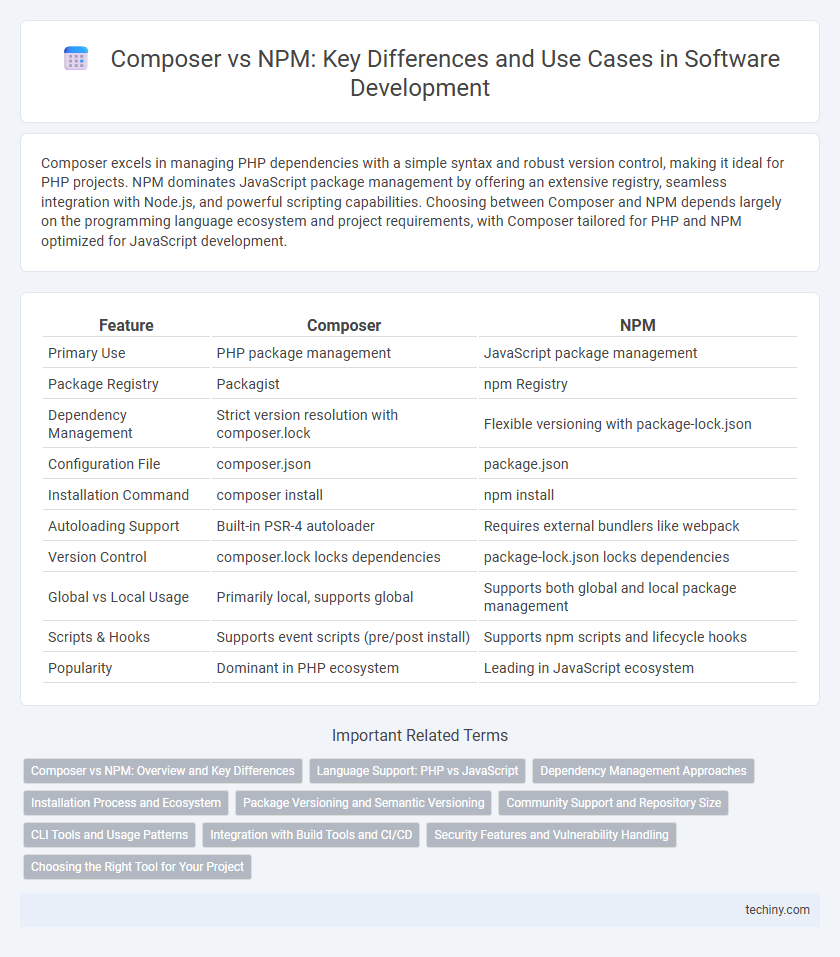Composer excels in managing PHP dependencies with a simple syntax and robust version control, making it ideal for PHP projects. NPM dominates JavaScript package management by offering an extensive registry, seamless integration with Node.js, and powerful scripting capabilities. Choosing between Composer and NPM depends largely on the programming language ecosystem and project requirements, with Composer tailored for PHP and NPM optimized for JavaScript development.
Table of Comparison
| Feature | Composer | NPM |
|---|---|---|
| Primary Use | PHP package management | JavaScript package management |
| Package Registry | Packagist | npm Registry |
| Dependency Management | Strict version resolution with composer.lock | Flexible versioning with package-lock.json |
| Configuration File | composer.json | package.json |
| Installation Command | composer install | npm install |
| Autoloading Support | Built-in PSR-4 autoloader | Requires external bundlers like webpack |
| Version Control | composer.lock locks dependencies | package-lock.json locks dependencies |
| Global vs Local Usage | Primarily local, supports global | Supports both global and local package management |
| Scripts & Hooks | Supports event scripts (pre/post install) | Supports npm scripts and lifecycle hooks |
| Popularity | Dominant in PHP ecosystem | Leading in JavaScript ecosystem |
Composer vs NPM: Overview and Key Differences
Composer is a dependency manager specifically designed for PHP projects, enabling developers to manage libraries and packages with version control tailored to PHP's ecosystem. NPM, a package manager for JavaScript, provides a vast registry for front-end and back-end development, offering extensive community support and versatile scripts management. Key differences include language specificity, ecosystem scope, and package handling methods, with Composer focusing on PHP libraries and NPM covering a broader JavaScript landscape.
Language Support: PHP vs JavaScript
Composer is the dependency manager specifically designed for PHP, supporting a wide range of PHP libraries and frameworks like Laravel and Symfony. NPM (Node Package Manager) caters to JavaScript, managing modules for both front-end and back-end development with frameworks such as React, Angular, and Node.js. Each tool is optimized for its respective language ecosystem, ensuring seamless package management and version control within PHP or JavaScript projects.
Dependency Management Approaches
Composer uses a declarative dependency management approach with a centralized composer.lock file to ensure consistent package versions across PHP projects. NPM leverages a flexible, nested dependency tree structure allowing multiple versions of the same package to coexist, optimizing JavaScript project compatibility. Composer's version constraints emphasize stability with semantic versioning, while NPM's approach supports rapid iteration and dependency resolution through package-lock.json files.
Installation Process and Ecosystem
Composer simplifies PHP dependency management with an installation process that requires downloading a single installer script, making it lightweight and easy to set up. NPM, integrated with Node.js, installs automatically when Node.js is set up, offering extensive package management for JavaScript with a vast ecosystem of over 1.3 million packages. Both ecosystems provide robust repositories, but NPM's larger community results in more frequent updates and diverse tools compared to Composer's focused PHP package collection.
Package Versioning and Semantic Versioning
Composer and NPM both implement semantic versioning to manage package dependencies, ensuring compatibility and stability across projects. Composer uses precise version constraints like caret (^), tilde (~), and exact versions to define acceptable updates, preventing unwanted breaking changes in PHP applications. NPM similarly employs semantic versioning with caret (^), tilde (~), and exact versioning, but allows flexible updates in Node.js environments, promoting faster adoption of minor and patch improvements.
Community Support and Repository Size
Composer excels in PHP package management with a robust community focused on PHP frameworks and libraries, maintaining over 60,000 packages in its repository. NPM, as the largest JavaScript package manager, features an extensive ecosystem with more than 1.9 million packages, supported by a vibrant global community of JavaScript developers. The vast difference in repository size and active contributor base makes NPM ideal for diverse JavaScript projects, while Composer remains the go-to for PHP-specific dependency management.
CLI Tools and Usage Patterns
Composer excels in managing PHP dependencies with a focus on declarative JSON configuration and precise version constraints, while NPM targets JavaScript ecosystems offering flexible semantic versioning and extensive script automation via package.json. Composer's CLI emphasizes explicit dependency resolution and autoloading optimization, whereas NPM provides versatile command options for package management, lifecycle scripts, and environment-specific settings. Usage patterns reflect Composer's typical PHP project integration and framework compatibility, contrasted with NPM's dominance in frontend tooling, build processes, and cross-platform JavaScript applications.
Integration with Build Tools and CI/CD
Composer excels in PHP projects with seamless integration into build tools like Jenkins and GitLab CI, enabling efficient dependency management and automated testing in CI/CD pipelines. NPM offers robust support for JavaScript ecosystems, easily integrating with popular build tools such as Webpack, Gulp, and continuous integration services like Travis CI and CircleCI for streamlined deployment. Both Composer and NPM enhance automation in CI/CD workflows, but their effectiveness depends on the programming language and specific build environment used.
Security Features and Vulnerability Handling
Composer integrates security features such as vulnerability advisories and automatic dependency updates through the Symfony Security Checker, enhancing PHP project safety. NPM uses audit commands to identify and fix vulnerabilities in JavaScript packages, with automatic remediation and detailed reports improving dependency security management. Both tools enable developers to maintain secure software ecosystems by proactively addressing package vulnerabilities and enforcing secure dependency practices.
Choosing the Right Tool for Your Project
Selecting the right package manager depends on the project's technology stack, with Composer tailored for PHP environments while NPM excels in JavaScript ecosystems. Composer offers robust dependency management for PHP frameworks such as Laravel and Symfony, ensuring version control and autoloading efficiency. NPM provides extensive module repositories and seamless integration with front-end and Node.js applications, supporting scalable and modular JavaScript development.
Composer vs NPM Infographic

 techiny.com
techiny.com